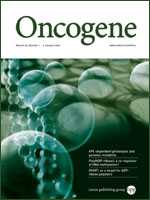Oncogene:靶向miRNA-29抑制乳腺癌分化
2012-08-13 Beyond 生物谷
最近,研究人员发现通过抑制一个关键的microRNA抑制乳腺癌细胞获得干细胞样特性的能力,在他们还没有分化前,而一旦分化获得干细胞样特性时会更耐化疗,患者预后也较差。相关研究论文发表在Oncogene杂志上。 论文的第一作者Diana Cittelly博士表示:我们将寻找microRNAs在乳腺癌细胞分化成具有侵略性、耐化疗特性的癌细胞表型中的作用,化疗耐药表型的乳腺癌细胞分化的microRNA
最近,研究人员发现通过抑制一个关键的microRNA抑制乳腺癌细胞获得干细胞样特性的能力,在他们还没有分化前,而一旦分化获得干细胞样特性时会更耐化疗,患者预后也较差。相关研究论文发表在Oncogene杂志上。
论文的第一作者Diana Cittelly博士表示:我们将寻找microRNAs在乳腺癌细胞分化成具有侵略性、耐化疗特性的癌细胞表型中的作用,化疗耐药表型的乳腺癌细胞分化的microRNA。因为一个microRNA可以调节许多基因参与癌症信号途径,我们希望找到一个能产生很多后续效应的靶基因。
具体来说,该项研究表明孕激素能调节miRNA-29,miRNA-29是一个能决定细胞基因能否翻译表达成蛋白的分子。孕激素对miRNA-29的这种调节导致了一个级联反应刺激乳腺癌细胞获到干细胞样特性。在动物模型中,这些干细胞样细胞帮助乳腺癌细胞抵抗目前的治疗手段。
Cittelly说我们可以操纵这个细胞系的miRNA-29,我们希望技术不是太远,这将使我们能够在未来递送miRNA-29进入人乳腺癌细胞中去。抑制miRNA-29的作用,乳腺癌细胞将无法获得干细胞样特性,失去他们的激素依赖特性。
编译自:The Making and Unmaking of Stem-Like, Aggressive Breast Cancer Cells

doi:10.1038/onc.2012.275
PMC:
PMID:
Progestin suppression of miR-29 potentiates dedifferentiation of breast cancer cells via KLF4
D M Cittelly, J Finlay-Schultz, E N Howe, N S Spoelstra, S D Axlund, P Hendricks, B M Jacobsen, C A Sartorius and J K Richer
The female hormone progesterone (P4) promotes the expansion of stem-like cancer cells in estrogen receptor (ER)- and progesterone receptor (PR)-positive breast tumors. The expanded tumor cells lose expression of ER and PR, express the tumor-initiating marker CD44, the progenitor marker cytokeratin 5 (CK5) and are more resistant to standard endocrine and chemotherapies. The mechanisms underlying this hormone-stimulated reprogramming have remained largely unknown. In the present study, we investigated the role of microRNAs in progestin-mediated expansion of this dedifferentiated tumor cell population. We demonstrate that P4 rapidly downregulates miR-29 family members, particularly in the CD44+ cell population. Downregulation of miR-29 members potentiates the expansion of CK5+ and CD44+ cells in response to progestins, and results in increased stem-like properties in vitro and in vivo. We demonstrate that miR-29 directly targets Krüppel-like factor 4 (KLF4), a transcription factor required for the reprogramming of differentiated cells to pluripotent stem cells, and for the maintenance of breast cancer stem cells. These results reveal a novel mechanism, whereby progestins increase the stem cell-like population in hormone-responsive breast cancers, by decreasing miR-29 to augment PR-mediated upregulation of KLF4. Elucidating the mechanisms whereby hormones mediate the expansion of stem-like cells furthers our understanding of the progression of hormone-responsive breast cancers.
本网站所有内容来源注明为“梅斯医学”或“MedSci原创”的文字、图片和音视频资料,版权均属于梅斯医学所有。非经授权,任何媒体、网站或个人不得转载,授权转载时须注明来源为“梅斯医学”。其它来源的文章系转载文章,或“梅斯号”自媒体发布的文章,仅系出于传递更多信息之目的,本站仅负责审核内容合规,其内容不代表本站立场,本站不负责内容的准确性和版权。如果存在侵权、或不希望被转载的媒体或个人可与我们联系,我们将立即进行删除处理。
在此留言








已学习
90
学习了,谢谢分享
77
#Gene#
48
#miR#
52
#miRNA-29#
46
#miRNA#
64
#Oncogene#
38